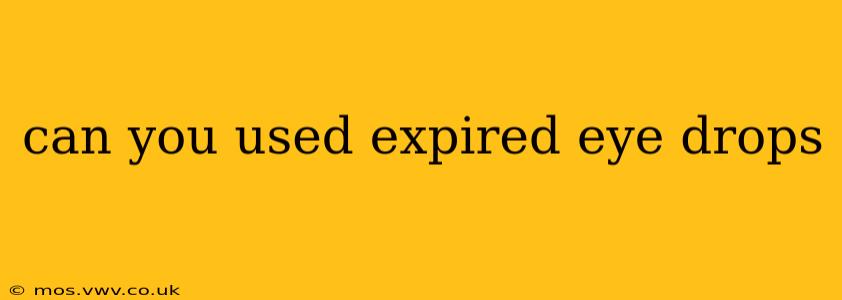Can You Use Expired Eye Drops? A Comprehensive Guide
Using expired eye drops might seem like a harmless act, especially if you only have a few drops left. However, the risks associated with using expired eye drops outweigh any potential benefits. This comprehensive guide will delve into the potential dangers, storage recommendations, and what to do with expired eye drops.
What Happens When Eye Drops Expire?
Eye drops, like many other medications, have a shelf life. Once the expiration date passes, the effectiveness of the active ingredients diminishes. This means the drops might not work as intended to treat your eye condition. More importantly, the formulation can change over time, potentially leading to the growth of harmful bacteria or fungi. These microorganisms can cause serious eye infections, ranging from mild irritation to severe vision impairment.
What are the Risks of Using Expired Eye Drops?
Using expired eye drops poses several significant risks:
- Ineffective Treatment: The active ingredients may lose their potency, rendering the drops useless in treating your eye condition. This could delay proper treatment and worsen your symptoms.
- Eye Infection: Expired eye drops can harbor bacteria or fungi, leading to infections like conjunctivitis (pink eye) or more serious conditions. These infections can be incredibly painful and require medical treatment.
- Allergic Reactions: The chemical makeup of the solution can change after expiration, potentially triggering allergic reactions in your eyes. This could manifest as itching, redness, swelling, or even more severe reactions.
How Long Are Eye Drops Good For After Opening?
While the expiration date on the bottle indicates the shelf life of unopened eye drops, the length of time they remain safe and effective after opening is shorter. Always check the label for specific instructions, but generally, opened eye drops should be discarded after one to three months, depending on the product and manufacturer.
How Should I Store Eye Drops?
Proper storage is crucial for maintaining the quality and safety of your eye drops. Follow these guidelines:
- Keep them at room temperature: Avoid extreme temperatures, such as direct sunlight or heat.
- Keep the bottle tightly closed: This prevents contamination and evaporation.
- Don't contaminate the tip: Avoid touching the dropper tip to your eye, fingers, or any other surface.
What Should I Do With Expired Eye Drops?
Once your eye drops have expired or reached their post-opening shelf life, discard them properly. Do not flush them down the toilet, as this could contaminate the water supply. Instead, check your local guidelines for proper disposal of medications. Many pharmacies offer take-back programs for expired medications.
Are there any exceptions to discarding expired eye drops?
No, there are no exceptions. The risks associated with using expired eye drops far outweigh any potential benefits. It's always better to err on the side of caution and discard them.
Can I use expired eye drops if they still look and smell fine?
No. Even if the eye drops look and smell normal, their chemical composition may have altered, making them unsafe to use. The expiration date indicates a point beyond which the manufacturer can no longer guarantee the product's quality and safety.
In conclusion, using expired eye drops is never recommended. The potential for serious eye infections and ineffective treatment far outweighs any perceived convenience. Always discard expired eye drops properly and consult an ophthalmologist or other eye care professional for any eye-related concerns.
